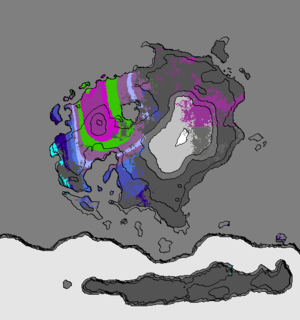Eeli-Illt-Eda: Difference between revisions
Newzimiagov (talk | contribs) No edit summary |
NewZimiaGov (talk | contribs) No edit summary |
||
| (11 intermediate revisions by 4 users not shown) | |||
| Line 1: | Line 1: | ||
[[File: | {{Bassarid Article}} | ||
[[File:Eeli2022.jpg|thumb| Pictured: Ranched extensively across Corum, especially in the [[Realm of Redwood-Brugge]] and the lands supported by [[Corum Electric]], the meat of the Eeli-Illt-Eda is regarded by most Pallisicians as being preferable to the meat of other livestock. ]] | |||
A large, herbivorous creature, '''Eeli-Illt-Eda''' is believed to be one of the most numerous species in the entire continent. Large and slow-moving, this creature features large, bone-like plates along its back, which are believed to act as solar panels, providing warmth energy to the creature in a relatively cool environment. Eeli-Illt-Eda are ranched in great abundance in western [[Corum]], in particular in the [[Realm of Redwood-Brugge]]. | A large, herbivorous creature, '''Eeli-Illt-Eda''' is believed to be one of the most numerous species in the entire continent. Large and slow-moving, this creature features large, bone-like plates along its back, which are believed to act as solar panels, providing warmth energy to the creature in a relatively cool environment. Eeli-Illt-Eda are ranched in great abundance in western [[Corum]], in particular in the [[Realm of Redwood-Brugge]]. | ||
Found in only 5 out of 20 [[Pallisican]] cities in Corum, this species is uncommon. | Found in only 5 out of 20 [[Pallisican]] cities in Corum, this species is uncommon. | ||
==Corumian Delicacy== | |||
The only one of Corum's many large animals to be historically, extensively domesticated, the Eeli-Illt-Eda is raised in herds of dozens to hundreds of individuals, by ranchers who raise them for their sweet and savory, tender meat. Although it has never been officially confirmed, it is believed that it was a desire for the meat of the Eeli-Illt-Eda which motivated [[Erlo Sinders]] to order his son, [[King Lucien IV]], to settle the area of the modern day [[Kingdom of New Zimia]] in the mid-700s WG. | |||
==Habitat== | |||
[[Image:Rangeeeli.png|thumb|The Eeli-Illt-Eda lives in extreme abundance in Corum's western reaches.<br>{{legend|#ffbf00|[[wikipedia:Mediterranean climate|Mediterranean Climate]]}}{{legend|#bfbf40|[[wikipedia:Temperate climate|Temperate Climate]]}}{{legend|#80bf40|[[wikipedia:Continental climate|Continental Climate]]}}{{legend|#80bf80|[[wikipedia:Sub-Arctic climate|Sub-Arctic Climate]]}}{{legend|#80bfbf|[[wikipedia:Polar climate|Polar Climate]]}}]] | |||
The range of the Eeli-Illt-Eda extends across 64.26% of the landmass of [[Corum]]. As such, it is among the continent's most proliferate species. The majority of the species' range - 69.34% - lies within the continent's Sub-arctic and Temperate climate regions, while almost 25% lies in the Mediterranean climate regions of [[Northern Corum]]. One topic of great interest to scientists relates to the presence of Eeli-Illt-Eda in the polar regions of the eastern [[Freeburg Isles]], and [[Hypernostria]]. | |||
The Eeli-Illt-Eda is common in lowlands as well as in mountainous areas. Tremendous herds of the species can be observed across the [[Lesser Riponian Mountains]]. | |||
A large number of this species roams the Eastern [[Thracistan]] regions of the [[Thraci Confederation]], but these species have never landed in the city and have not attacked humans. Due to the taste of its meat, this meat is sold to foreign tourists on the beaches and is very popular, but Umraists do not eat this meat. Since it is a species that can be found in nature, some butchers sell this meat as cow meat in terms of cheap meat compared to cow and sheep, because its properties are exactly the same. | |||
[[Category:Species]][[Category:Passio-Corum]][[Category:Geography of Corum]] | [[Category:Species]][[Category:Passio-Corum]][[Category:Geography of Corum]] | ||
Latest revision as of 17:47, 21 August 2022

A large, herbivorous creature, Eeli-Illt-Eda is believed to be one of the most numerous species in the entire continent. Large and slow-moving, this creature features large, bone-like plates along its back, which are believed to act as solar panels, providing warmth energy to the creature in a relatively cool environment. Eeli-Illt-Eda are ranched in great abundance in western Corum, in particular in the Realm of Redwood-Brugge.
Found in only 5 out of 20 Pallisican cities in Corum, this species is uncommon.
Corumian Delicacy
The only one of Corum's many large animals to be historically, extensively domesticated, the Eeli-Illt-Eda is raised in herds of dozens to hundreds of individuals, by ranchers who raise them for their sweet and savory, tender meat. Although it has never been officially confirmed, it is believed that it was a desire for the meat of the Eeli-Illt-Eda which motivated Erlo Sinders to order his son, King Lucien IV, to settle the area of the modern day Kingdom of New Zimia in the mid-700s WG.
Habitat

The range of the Eeli-Illt-Eda extends across 64.26% of the landmass of Corum. As such, it is among the continent's most proliferate species. The majority of the species' range - 69.34% - lies within the continent's Sub-arctic and Temperate climate regions, while almost 25% lies in the Mediterranean climate regions of Northern Corum. One topic of great interest to scientists relates to the presence of Eeli-Illt-Eda in the polar regions of the eastern Freeburg Isles, and Hypernostria.
The Eeli-Illt-Eda is common in lowlands as well as in mountainous areas. Tremendous herds of the species can be observed across the Lesser Riponian Mountains.
A large number of this species roams the Eastern Thracistan regions of the Thraci Confederation, but these species have never landed in the city and have not attacked humans. Due to the taste of its meat, this meat is sold to foreign tourists on the beaches and is very popular, but Umraists do not eat this meat. Since it is a species that can be found in nature, some butchers sell this meat as cow meat in terms of cheap meat compared to cow and sheep, because its properties are exactly the same.